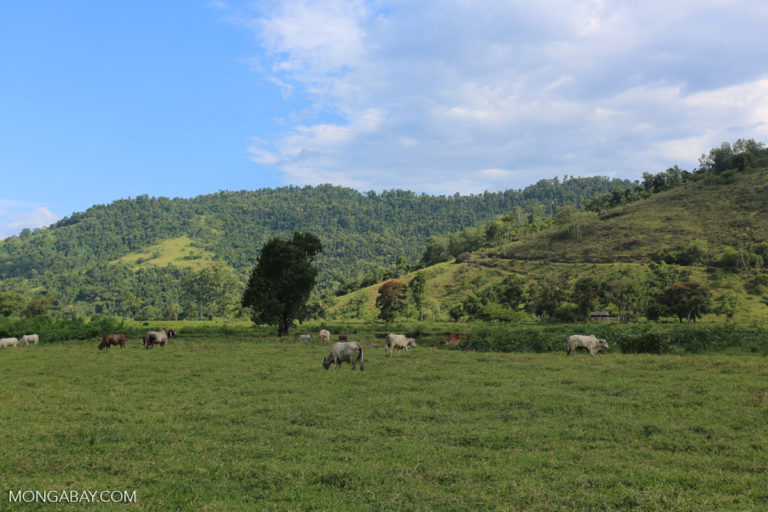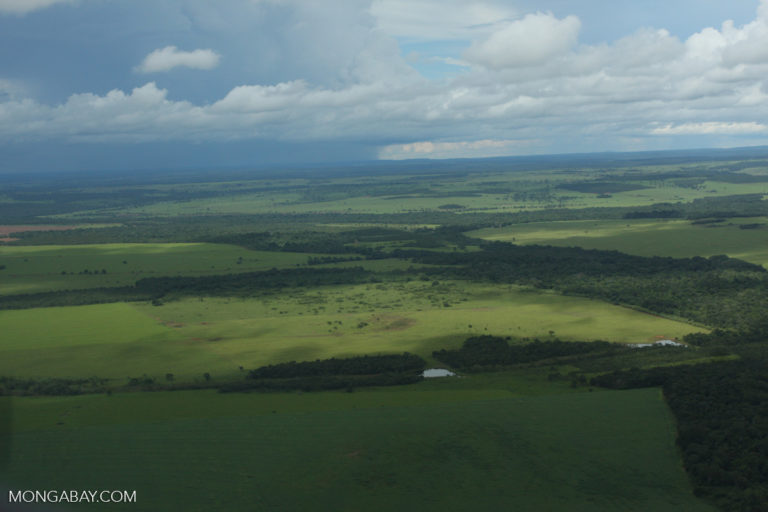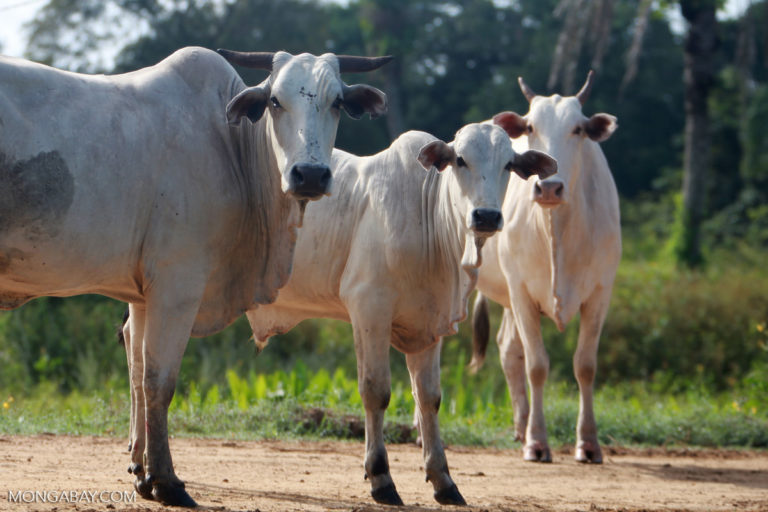- On March 17, agents with Brazil’s Federal Police raided facilities belonging to JBS and another food processing giant, BRF, as well as several smaller companies.
- The raids were the culmination of a two-year investigation, called “Operation Weak Flesh,” into an alleged scheme by which JBS, BRF, and others were bribing government officials to look the other way as they sold and exported rotten and salmonella-tainted beef, pork, and poultry.
- Just four days after its plants were raided as part of the corruption probe, JBS found itself embroiled in another scandal. On March 21, as part of a three-year operation code-named “Cold Meat,” Brazil’s environmental protection agency, Ibama, raided two JBS meatpackers in the state of Pará that are accused of having purchased thousands of heads of cattle raised on illegally deforested land in the Amazon.
The month of March saw the world’s largest meatpacker, Brazilian company JBS, rocked by not one but two major scandals.
On March 17, agents with Brazil’s Federal Police raided facilities belonging to JBS and another food processing giant, BRF, as well as several smaller companies. The raids were the culmination of a two-year investigation, called “Operation Weak Flesh,” into an alleged scheme by which JBS, BRF, and others were bribing government officials to look the other way as they sold and exported rotten and salmonella-tainted beef, pork, and poultry.
According to the New York Times, 33 federal inspectors are being investigated for accepting bribes to ignore the adulteration and expiration of processed meats and falsifying sanitary permits. Exports from 21 meatpacking plants were suspended, as well.
Confidence in Brazil’s food sector took a major hit, with several key export markets, including China, the EU, Japan, and Mexico, announcing bans or restrictions on imports from Brazilian meatpacking companies (some of which have already been lifted).
As a result, Brazilian meat exports fell to just $74,000 on March 21, a drastic reduction compared to the daily average for March of $63 million. JBS responded by announcing on March 27 that it was halting beef production at 33 of its 36 plants, though the company said it planned to resume operating the plants at two-thirds capacity the following week.
JBS and BRF have both denied any wrongdoing.
Just four days after its plants were raided as part of the corruption probe, however, JBS found itself embroiled in another scandal. On March 21, as part of a three-year operation code-named “Cold Meat,” Brazil’s environmental protection agency, Ibama, raided two JBS meatpackers in the state of Pará that are accused of having purchased thousands of heads of cattle raised on illegally deforested land in the Amazon.

Ibama investigators said they determined that the two JBS plants had bought some 59,000 cows from ranching operations located on 507 square kilometers (about 196 square miles) of land that is under embargo due to illegal deforestation in the area. About 90 percent of the cattle raised on the land went to the JBS plants, Climate Home reported, while the rest went to 13 other, smaller meatpackers.
JBS denied the allegations in a statement issued by company spokesperson Cameron Bruett: “JBS does not currently purchase and has not purchased any animals from the suppliers on the list of areas embargoed by IBAMA. JBS prioritizes the issues of deforestation and sustainability, as evidenced by the sophisticated satellite monitoring system of cattle suppliers we deploy to verify compliance with JBS environmental and sustainability standards. Our last three independent audits resulted in social and environmental compliance rates of more than 99.9 percent. Any supplier found out of compliance with our strict standards is immediately blocked from our internal system and ineligible to sell livestock to the company.”
In response to the second scandal involving JBS uncovered in the course of one week, the environmental NGO Greenpeace said it was immediately suspending negotiations with the company. The group said in a statement that the purchase of cattle from illegally deforested areas is an environmental crime and the government’s allegations against JBS constitute a breach of a Plea Agreement (“Termo de Ajuste de Conduta” in Portuguese) reached in 2009 between Brazil’s Federal Public Ministry and 69 companies, including JBS.
JBS is also a signatory to the voluntary Cattle Agreement of 2009, Greenpeace noted, which means the company has committed to ensuring that its source farms are not involved in any deforestation, slave labor, or invasions of indigenous lands and protected areas.
“Greenpeace considers the accusations against JBS to be extremely serious, and therefore we are suspending negotiations with the company until it can prove that the meat is free of deforestation, slave labor and conflicts with indigenous lands or protected areas,” Tica Minami, Amazon Director of Greenpeace Brazil, said in the statement.

A report by Chain Reaction Research published last year found that cattle ranching is not just a main driver of deforestation in South America but the main driver. In Brazil, Colombia, Ecuador, and Peru, for instance, over 70 percent of combined deforestation is linked to the cattle industry.
That figure is even higher in Brazil, however. The country has the largest commercial cattle herd in the world and produces more beef than any other Amazonian country — and according to the report, cattle herding accounted for more than 80 percent of the deforestation that occurred in Brazil between 1990 and 2005.
Despite its outsize role in driving Amazon deforestation, the cattle industry has made relatively little progress in achieving sustainable supply chains compared to producers of other commodities like soy and palm oil. Marcio Nappo, sustainability director for JBS, told Mongabay earlier this month that the complexities of the cattle supply chain make it particularly difficult to root out links to deforestation and human rights abuses. Supply chain transparency is especially difficult for the cattle industry, he said, because cattle can change hands multiple times before making their way to a JBS plant.
“I cannot control my raw materials; it is a pure commodity market, driven by price,” Nappo said. “I don’t have any idea who will be my supplier tomorrow.”
JBS employees told Mongabay correspondents Sue Branford and Mauricio Torres, whose 12-part series for Mongabay in collaboration with The Intercept Brazil looks at numerous threats to the Amazon, that “cattle laundering,” in which cattle owners move animals reared on illegally cleared land to pastures that are not under embargo before taking them to the slaughterhouse, has become a widespread tactic for getting around the commitments meatpackers made in the 2009 Cattle Agreement.
Ranchers are certainly one of the weak links in attempts to build a more sustainable supply chain for cattle products coming out of Brazil. According to one analysis, only a few ranchers in the country, whose combined holdings constitute a “tiny fraction” of one percent of Brazil’s total pastureland, have received certification through a system created by the Sustainable Agriculture Network to encourage the adoption of sustainable ranching practices.

Follow Mike Gaworecki on Twitter: @mikeg2001
FEEDBACK: Use this form to send a message to the author of this post. If you want to post a public comment, you can do that at the bottom of the page.